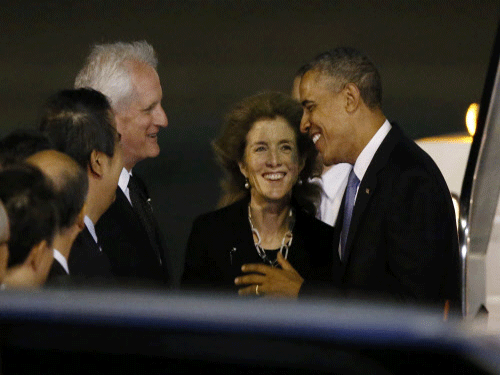
US President Barack Obama landed in Tokyo today to launch an Asian tour dedicated to reinvigorating his policy of "rebalancing" US foreign policy towards a dynamic Asia.
Obama landed aboard Air Force One to begin a state visit to Japan, which comes as regional tensions boil over maritime territorial disputes and fears that North Korea could soon carry out a new nuclear test.
The president touched down a day after nearly 150 lawmakers paid homage at a controversial Tokyo war shrine seen by neighbouring nations as a symbol of Japan's brutal imperialist past, and shortly after the prime minister made a shrine offering.
Days earlier, China seized a huge Japanese freighter over what a Shanghai court says are unpaid bills relating to Japan's 1930s occupation of vast swathes of the country.
In the seas to the southwest, boats from China and Japan spar for ownership of a small chain of islands. And an ever-unpredictable North Korea -- which has denounced the presidential tour as "reactionary and dangerous" -- appears to be trying to seize the spotlight with preparations for a fourth nuclear test.
Despite the increasingly tense security situation, getting top regional US allies Japan and South Korea -- Obama's next destination -- to talk to each other is tricky.
South Korean President Park Geun-Hye and Japanese Prime Minister Shinzo Abe have met just once since both came to power over a year ago, and only then when the US leader cajoled them into a choreographed photo op.
East Asia is a tumultuous region with a multitude of fractures that the US has done little to mend over the last half-century, said Christian Wirth, a research fellow at Griffith University in Australia.
"Since the establishment of the post-war regime in San Francisco in 1951 and the onset of the Korean War in 1950, (the US has been) directly and deeply involved in East Asian politics," he told AFP.
"Washington's preference for bilateralism has contributed to the lack of intra-Asian cooperation and historical reconciliation."
That bilateralism begins this evening with a one-on-one dinner between Obama and Abe, reportedly at an exclusive sushi restaurant in the basement of an ageing office building in the glitzy Ginza district of Tokyo.
Deccan Herald is on WhatsApp Channels| Join now for Breaking News & Editor's Picks